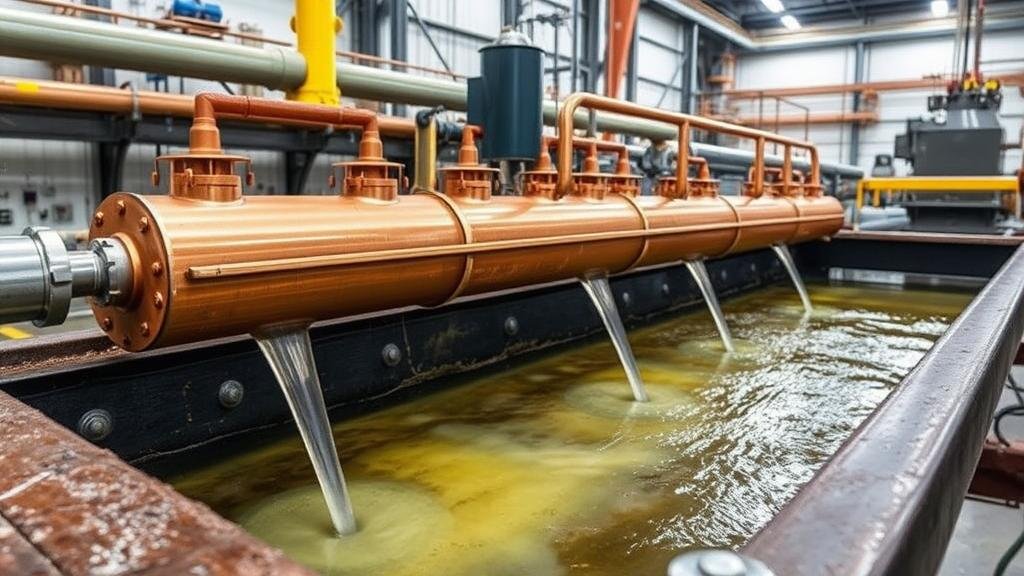Understanding Copper Leaching Systems for Low-Grade Ore Processing
Understanding Copper Leaching Systems for Low-Grade Ore Processing
Copper leaching is a hydrometallurgical process that extracts copper from low-grade ores. This method is gaining traction due to the ever-increasing demand for copper and the difficulties associated with mining high-grade ores. This article will delve into the fundamentals of copper leaching systems, their types, processes, advantages, challenges, and real-world applications.
What is Copper Leaching?
Copper leaching refers to the extraction of copper from its ores using aqueous chemistry. In contrast to conventional smelting processes that require high-grade ores, leaching can exploit lower-grade materials, making it a crucial component in modern copper production.
The Leaching Process
The copper leaching process typically involves several key stages:
- Heap Leaching: In this method, crushed ore is piled up on a site known as a heap. A dilute solution of sulfuric acid is then applied to the heap. The solution permeates through the ore, dissolving copper ions.
- Agitation Leaching: This involves mixing crushed ore with leaching solution in tanks, allowing for better contact between the ore and the reagent, enhancing the overall extraction rate.
- Dump Leaching: Similar to heap leaching, this process uses larger piles of ore that are less refined. Solutions are trickled through the dump to retrieve copper over a longer period.
Types of Leaching Agents
The choice of leaching agents is paramount in optimizing copper recovery. Here are the most commonly used agents:
- Sulfuric Acid: This is the most widely used leaching agent in copper extraction, known for its effectiveness and cost-efficiency.
- Chloride Solutions: These are alternative leaching agents, particularly in specific environmental conditions where sulfuric acid may not be viable.
Advantages of Copper Leaching
Copper leaching has several advantages, particularly when it comes to low-grade ores:
- Environmentally Friendly: Leaching often produces less waste compared to traditional methods, which can have a lesser environmental impact.
- Cost-Effective: Utilizing low-grade ores allows mining operations to remain profitable in markets where high-grade resources are dwindling.
- Operational Flexibility: Leaching can be performed in various conditions and can be adapted to specific ore types effectively.
Challenges and Considerations
Although copper leaching is favorable, it poses certain challenges:
- Slow Process: The leaching process can be relatively slow, often taking months to extract the desired copper amounts.
- Environmental Concerns: If not managed correctly, leaching agents can contaminate surrounding soil and groundwater.
- Ore Type Variability: Different ores react differently to leaching processes, which can complicate production planning.
Real-World Applications
Copper leaching is successfully implemented in various mining operations worldwide. A notable example is the BHP Billitons Escondida mine in Chile, which has effectively utilized heap leaching to extract copper from low-grade ores, allowing the company to maintain production levels despite declining grades.
Also, the solution extraction and electrowinning (SX/EW) process is becoming increasingly common, where the copper solution obtained from leaching is further processed to produce high-purity electroformed copper.
Conclusion
Understanding copper leaching systems is essential to addressing the challenges posed by declining high-grade ore reserves. By leveraging various leaching methods and agents, mining companies can efficiently extract copper from low-grade ores. As the demand for copper continues to rise, so too does the importance of improving and optimizing leaching technologies, ensuring sustainable practices in the mining sector.
Actionable Takeaway: For mining operations considering low-grade ore processing, evaluating the appropriate leaching method and agent while mitigating environmental concerns can optimize both productivity and sustainability. In doing so, companies can navigate the dynamic landscape of copper demand effectively.



